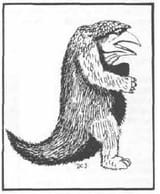>>95899352>Holy Apple portmanteu'd to holappleWell tickle me pink and call me a flamingo but I don't see the resemblance. Avalon and holapple are both three syllable words with a and l, but in a happy coincidence that I didn't plan when I wrote that first sentence, so is flamingo, and those similarities don't count for much.
Avalon however I can see is a lot like avallo. In Celtic avallo meant fruit, not just apple. In English too until a few hundred years ago apple meant almost any nut or fruit but not berries. In Latin, pomus meant any fruit, including berries, or nut, or the tree they grew on.
Geoffrey of Monmouth was the first to mention Avalon. He was writing 900 years ago when apple/avallo/pomus meant almost any fruit or nut not just what we today call apples. He first called the place Avallo and in a later book he called it Insula Pomorum. Insula means island and pomorum is the genitive plural of pomum. In Modern English it would be Island of Fruit/Apples.
Thank you for taking my question seriously. Do you know of anything more convincing than what you have said? The similarity between Avallo/avalon, which is not folk etymology but serious etymological research, is readily apparent but avalon/holapple is missing a whole lot of steps to say one morphed from the other. It doesn't look to me that Avalon is a portmanteau or any compound noun, and that the people making fun of the anon for not knowing Avalon is a mashup of two words might in fact have egg on their own faces for saying it is.



